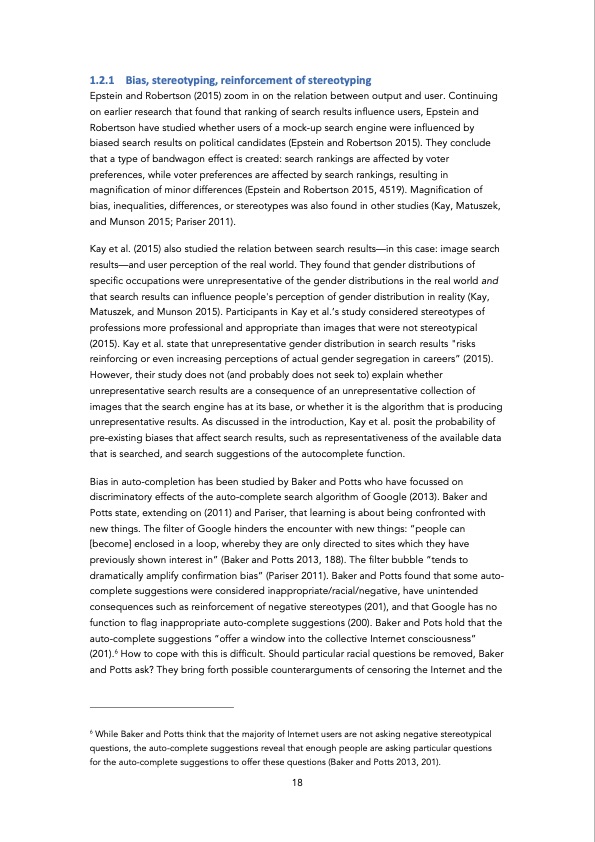
PDF Publication Title:
Text from PDF Page: 018
1.2.1 Bias, stereotyping, reinforcement of stereotyping Epstein and Robertson (2015) zoom in on the relation between output and user. Continuing on earlier research that found that ranking of search results influence users, Epstein and Robertson have studied whether users of a mock-up search engine were influenced by biased search results on political candidates (Epstein and Robertson 2015). They conclude that a type of bandwagon effect is created: search rankings are affected by voter preferences, while voter preferences are affected by search rankings, resulting in magnification of minor differences (Epstein and Robertson 2015, 4519). Magnification of bias, inequalities, differences, or stereotypes was also found in other studies (Kay, Matuszek, and Munson 2015; Pariser 2011). Kay et al. (2015) also studied the relation between search results—in this case: image search results—and user perception of the real world. They found that gender distributions of specific occupations were unrepresentative of the gender distributions in the real world and that search results can influence people's perception of gender distribution in reality (Kay, Matuszek, and Munson 2015). Participants in Kay et al.’s study considered stereotypes of professions more professional and appropriate than images that were not stereotypical (2015). Kay et al. state that unrepresentative gender distribution in search results "risks reinforcing or even increasing perceptions of actual gender segregation in careers” (2015). However, their study does not (and probably does not seek to) explain whether unrepresentative search results are a consequence of an unrepresentative collection of images that the search engine has at its base, or whether it is the algorithm that is producing unrepresentative results. As discussed in the introduction, Kay et al. posit the probability of pre-existing biases that affect search results, such as representativeness of the available data that is searched, and search suggestions of the autocomplete function. Bias in auto-completion has been studied by Baker and Potts who have focussed on discriminatory effects of the auto-complete search algorithm of Google (2013). Baker and Potts state, extending on (2011) and Pariser, that learning is about being confronted with new things. The filter of Google hinders the encounter with new things: “people can [become] enclosed in a loop, whereby they are only directed to sites which they have previously shown interest in” (Baker and Potts 2013, 188). The filter bubble “tends to dramatically amplify confirmation bias” (Pariser 2011). Baker and Potts found that some auto- complete suggestions were considered inappropriate/racial/negative, have unintended consequences such as reinforcement of negative stereotypes (201), and that Google has no function to flag inappropriate auto-complete suggestions (200). Baker and Pots hold that the auto-complete suggestions “offer a window into the collective Internet consciousness” (201).6 How to cope with this is difficult. Should particular racial questions be removed, Baker and Potts ask? They bring forth possible counterarguments of censoring the Internet and the 6 While Baker and Potts think that the majority of Internet users are not asking negative stereotypical questions, the auto-complete suggestions reveal that enough people are asking particular questions for the auto-complete suggestions to offer these questions (Baker and Potts 2013, 201). 18PDF Image | peek into the discursive construction of the Google Search Algorithm: A critical discourse analysis

PDF Search Title:
peek into the discursive construction of the Google Search Algorithm: A critical discourse analysisOriginal File Name Searched:
thesis-google-search-algotithm.pdfDIY PDF Search: Google It | Yahoo | Bing
Cruise Ship Reviews | Luxury Resort | Jet | Yacht | and Travel Tech More Info
Cruising Review Topics and Articles More Info
Software based on Filemaker for the travel industry More Info
The Burgenstock Resort: Reviews on CruisingReview website... More Info
Resort Reviews: World Class resorts... More Info
The Riffelalp Resort: Reviews on CruisingReview website... More Info
| CONTACT TEL: 608-238-6001 Email: greg@cruisingreview.com | RSS | AMP |